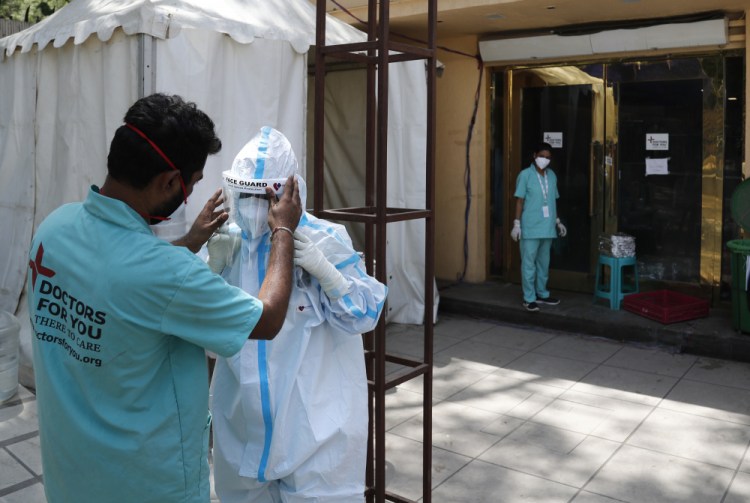India reported more than 300,000 new confirmed coronavirus cases for the sixth day in a row Tuesday as the country battled a wave of illnesses that’s overwhelmed its health-care system.
Tedros Adhanom Ghebreyesus, the head of the World Health Organization, called the situation in India “beyond heartbreaking.” He warned that many countries “are still experiencing intense transmission,” with more new cases globally in the past week than in the first five months of the pandemic.
India’s spike in new cases has helped push global infection rates to record levels. The country announced 323,144 new infections over the prior 24 hours, a 10% drop from the day before, but experts warned that this may be more a function of a drop in testing than a sign that the new wave is abating.
An additional 2,771 people have died, a number also considered an undercount amid reports that many probable COVID-19 deaths are being officially attributed to underlying causes or going unrecorded.
Medical facilities in India, especially in the larger cities, have been under strain from the flood of patients as the number of cases skyrocketed in the past few weeks under the pressure of new, more virulent variants and relaxed restrictions. Hospitals in some cities have stopped admitting patients amid a desperate scramble for supplemental oxygen, ventilators and medicine. In some hospitals, patients have died after supplemental oxygen ran out.

A health worker takes a nasal swab sample of a woman as others wait their turn to test for COVID-19 in Hyderabad, India, Sunday, April 25. AP Photo/Mahesh Kumar A.
That’s led to growing anger at Indian Prime Minister Narendra Modi, whose government permitted crowded election rallies and religious festivals, and boasted of having neared the end of the pandemic weeks before the latest surge began. Many are also frustrated at delays in the inoculation program in a country that’s the world’s largest producer of vaccines.
The Indian government has attempted to stifle criticism during the new outbreak, including petitioning Twitter to remove tweets critical of the government’s handling of the crisis. On Tuesday, it took aim at an Australian newspaper, branding an article it reprinted as “malicious and slanderous” for its criticism of Modi’s handling of the coronavirus pandemic.
In India’s hard-hit capital, New Delhi, reports Monday that authorities had ordered a luxury hotel to be turned into a health facility to exclusively serve high court judges and their families infected with the coronavirus sparked outrage, Reuters reported.
The local government said that the Delhi High Court had requested to reserve 100 rooms at the Ashoka Hotel for judges and their families. But on Tuesday, the court pushed back, saying it never asked for the special treatment, and called the provision of special treatment “wrong,” India’s NDTV reported.
As the crisis continues, global pledges to deliver medical supplies to the stricken country are growing.
President Joe Biden told Modi on Monday that supplemental oxygen, therapeutics and vaccines were on the way. The United States has said it would release its stockpile of 60 million Oxford-AstraZeneca vaccines to the world, though it could take months for U.S. regulators to clear the move.
American biopharmaceutical company Gilead Sciences confirmed Monday that it would give India almost half a million vials of the antiviral drug remdesivir, which experts say has been successful in treating COVID-19 patients. India’s hospitals are running low on supplies, and the medication is being sold at extortionate rates on the black market.
On Tuesday, Britain’s first shipment of aid arrived in the country, including 100 ventilators and 95 oxygen concentrators, with more on the way. France, among other countries, also announced plans to send medical equipment.
Tedros said 2,600 WHO staffers have been sent to help India. He added that the WHO has sent “critical equipment and supplies, including thousands of oxygen concentrators, prefabricated mobile field hospitals and laboratory supplies.”
India’s armed forces announced Monday that they would be pitching in as well, releasing supplemental oxygen from reserves and calling back retired medical personnel to help in hospitals struggling under the load of new patients.
Send questions/comments to the editors.



Success. Please wait for the page to reload. If the page does not reload within 5 seconds, please refresh the page.
Enter your email and password to access comments.
Hi, to comment on stories you must . This profile is in addition to your subscription and website login.
Already have a commenting profile? .
Invalid username/password.
Please check your email to confirm and complete your registration.
Only subscribers are eligible to post comments. Please subscribe or login first for digital access. Here’s why.
Use the form below to reset your password. When you've submitted your account email, we will send an email with a reset code.